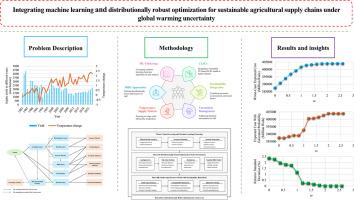Integrating machine learning and distributionally robust optimization for sustainable agricultural supply chains under global warming uncertainty
IF 3.9
2区 工程技术
Q2 COMPUTER SCIENCE, INTERDISCIPLINARY APPLICATIONS
引用次数: 0
Abstract
Agricultural supply chains face substantial challenges in ensuring food security and sustainability, particularly due to the impacts of climate change, including global warming. To optimize resource use and minimize waste, it is essential to manage these supply chains effectively, especially in the face of uncertainty. This research addresses the crucial challenge of designing a sustainable closed-loop agricultural supply chain network, with a specific focus on jujube products in the context of temperature-yield uncertainty. The model enhances economic sustainability by minimizing costs, social sustainability through job creation requirements, and environmental sustainability by implementing carbon emission caps, while taking into account decisions regarding facility locations, inter-facility flows, inventory, and shortage management. Our main contribution is a distributionally robust optimization approach that integrates a K-means clustering machine learning algorithm to generate scenarios from historical data patterns, addressing the dynamic and interrelated uncertainties in temperature-yield data. The framework incorporates closed-loop principles through thermochemical conversion processes that transform agricultural waste into value-added biochar products. A comprehensive case study of the jujube industry in South Khorasan Province, Iran, validates the model's effectiveness. Results demonstrate that moderate conservatism levels ( between 0.8 and 1.2) achieve an 88% reduction in operational risk variability while incurring only a 3% cost increase. A comparative analysis reveals that the proposed approach achieves a 0.95 risk-adjusted performance score, outperforming traditional stochastic programming and robust optimization alternatives. This research provides agricultural supply chain managers with practical guidelines for managing temperature-yield uncertainty.

全球变暖不确定性下可持续农业供应链的机器学习与分布鲁棒优化集成
农业供应链在确保粮食安全和可持续性方面面临重大挑战,特别是由于包括全球变暖在内的气候变化的影响。为了优化资源利用并最大限度地减少浪费,必须有效地管理这些供应链,特别是在面对不确定性的情况下。本研究解决了设计可持续闭环农业供应链网络的关键挑战,特别关注温度-产量不确定性背景下的枣产品。该模型通过降低成本来提高经济可持续性,通过创造就业机会来提高社会可持续性,通过实施碳排放上限来提高环境可持续性,同时考虑到有关设施位置、设施间流动、库存和短缺管理的决策。我们的主要贡献是一种分布式鲁棒优化方法,该方法集成了K-means聚类机器学习算法,从历史数据模式中生成场景,解决了温度-产量数据中动态和相关的不确定性。该框架通过将农业废物转化为增值生物炭产品的热化学转化过程纳入闭环原则。伊朗南呼罗珊省枣业的综合案例研究验证了该模型的有效性。结果表明,适度的保守性水平(ω在0.8和1.2之间)可以降低88%的操作风险变异性,同时只增加3%的成本。对比分析表明,该方法的风险调整性能得分为0.95,优于传统的随机规划和鲁棒优化方案。本研究为农业供应链管理者提供了管理温度-产量不确定性的实用指南。
本文章由计算机程序翻译,如有差异,请以英文原文为准。
求助全文
约1分钟内获得全文
求助全文
来源期刊

Computers & Chemical Engineering
工程技术-工程:化工
CiteScore
8.70
自引率
14.00%
发文量
374
审稿时长
70 days
期刊介绍:
Computers & Chemical Engineering is primarily a journal of record for new developments in the application of computing and systems technology to chemical engineering problems.
 求助内容:
求助内容: 应助结果提醒方式:
应助结果提醒方式:


